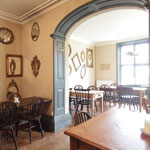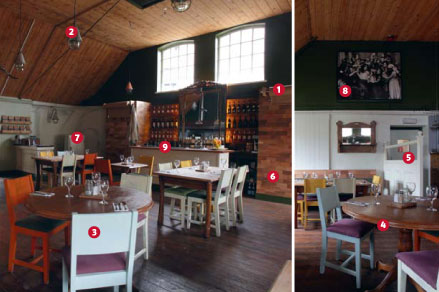Budget makeovers: The recycled restaurant
Waste not, want not is the philosophy behind the refurbishment of the George Inn, in Wedmore, Somerset, where all the materials for the project have been reclaimed, found or bought second hand. James Stagg reports
Most operators have a recycling policy in place, but very few could claim that every material they've used to build and furnish their business has been reclaimed. But in Somerset one couple are putting their passion for reuse into a new restaurant.
Gordon Stevens and Rachel White took over the George Inn at the heart of the village of Wedmore in December 2009 and have since set about returning the pub to the original coaching inn concept of pub, restaurant and accommodation.
They have taken on the reinvigoration of the property in stages, first completing the bar and dining areas before turning their attentions to renovating the rooms and overhauling an underused function room.
The entire project has been taken on with a focus on reuse and recycling wherever possible. Stevens has 15 years' experience in restoration and is at home working on the 15th century pub, while White takes on the interior design. Both are conscious of the need to reuse materials wherever possible, for financial prudence as well as environmental awareness.
"We had to take the project on in stages. If you were going to attack it in one fell swoop it would cost something in the region of £600,000. It's unlikely an individual would do that as the total investment would have been over £1m - including purchase costs."
The completed pub looks as though it has evolved over time, with an eclectic combination of old and new. It serves West Country beers and ciders alongside locally sourced produce prepared by chef Richard Sampson.
With the bar obviously aimed at adults, Stevens and White recognised a gap in the market for a more family-friendly operation. This led to the creation of the new 1760 pizza and pasta restaurant where the pair's passion for salvaging has really taken shape. It is called 1760 in recognition of the ascension of King George III, whose waste-not-want-not philosophy has been embraced in its fit out.
affordable portions
"In the bar Richard serves great quality food, but because of the style it doesn't necessarily suit younger kids," explains Stevens.
"We're always happy to do part portions but there isn't a formal children's menu. In 1760 we can do more affordable portions for children. We offer three courses for £6 and that obviously draws in the adults too.
"The pub is a 15th century building that's then been added to over time so it's quite enclosed, whereas here it's more light, airy and family-oriented."
Taking their sustainability policy to the extreme, almost everything used to build and furnish the former function room has been reclaimed, found or bought second hand. Along with chef-manager Alex Silk, Stevens and White have scoured car boot sales, auctions and websites as well as taking unwanted materials and furniture from guests and even other operators.
"Everything is found, borrowed, recycled or taken - in a legitimate way," confirms Silk, who is responsible for all the food in the restaurant. An avid collector, he has sourced many of the recycled materials in the restaurant, helping create a space that has the cohesive ambience of an airy pizzeria that defies the disparate nature of its design.
"Trying to find and buy something that you think would fit in takes time," Silk adds. "I'm a hoarder so I've got a unit where I can keep acquisitions until I find a home for them."
The team restricted themselves in terms of budget, in the process saving an estimated 60% on purchasing costs. However, Stevens warns that putting a figure on the saving can be misleading.
But it's been a labour of love for Stevens and Silk, who have harnessed their creativity in the sourcing and fit out of the restaurant. Hence there are stories behind almost every element. Take the tables, found for a bargain price thanks to Silk's eye for an error on online auction sites.
"I'm a real stickler for misspelt auction items," he says. "There's a website called fatfingers.com and it searches on eBay for almost every spelling and all the potential mistakes. We found some dinner tables misspelt which we went down and picked up for £10 a table. They're solid oak and a real bargain."
But, as Stevens cautions, that figure doesn't fully account for their cost. "We did have to sand down all of them, which took a day of our time. So it still makes something which seems cheap at £60 become £260. It's still cheap - incredibly cheap - but it's not as cheap."
Meanwhile, the chairs were bought for a knockdown price as they'd been left over after an auction had finished and have since been covered with recycled leather from a local Mulberry factory.
Silk explains: "We went to an auction but turned up on the wrong date so I asked what was left and we ended up with more than we would have bought on the day. I covered them with material bought from a shop round the corner while a couple are covered in Mulberry leather from a director who lives in the village. He basically had bags of damaged off-cuts that they weren't able to use. They were defective but in such a minor way that it wouldn't make any difference to us."
car boot
Elsewhere, the lighting was reclaimed from a factory, old floorboards are employed around the open plan kitchen, the room divider was rescued from a pub car park and most of the crockery came from Cheddar car boot sale.
"I go to church every Sunday morning - for Cheddar car boot sale," Silk adds. "One day I found a guy with what he described as boxes of wood. He said they were smoke planks to smoke fish. I think I paid £2 a box and we've used them as tiles. It transformed the area behind the bar into a feature wall with reclaimed floorboards used as shelves."
Even the pizza oven has been recycled from a failed business. "One of our suppliers had sold one to another place that went bust and were asking just £600 for it," Stevens says. "They're worth £3,500 so we took it along with some other stock including plates."
It's certainly been a challenge for the trio, but one that they've clearly relished.
"We've had to look at things in a totally different way to control costs," says Stevens. "It's more organic and it's more renovating the existing pieces so it's more in harmony with the building. We could have spent more and done it faster but it wouldn't have been as enjoyable and we wouldn't have derived the same level of satisfaction."
around the restaurant: a testament to thrift
2 Lighting If bought new, the total cost of electrical equipment would have been about £8,000, but Stevens and Silk have done it for a quarter of that using light fittings recovered from an old factory and taking on as much of the wiring as they could themselves.
3 Chairs and stools Sourced at an auction having turned up the day after the sale and found the lot left behind. "It was the same with the stools," Silk recalls. "we only needed six but ended up with 22."
4 Tables Found after being spelt incorrectly on an auction site and not attracting any attention, the solid oak tables were a steal at £10 each.
5 Partitions Seen leaning next to a skip belonging to another operator. Silk went in, bought a drink, spoke to the landlord, and left with what had been put aside as firewood.
6 Tiles Found at Cheddar car boot sale for £2 a box, the tiles are cedar blocks that were designed for smoking fish.
7 Feature fridge Silk went to an auction and once again missed the sale. However, he saw someone heading off with a vintage fridge that had been bought for £10. He offered the buyer £20 and now uses the fridge as a feature storage cupboard.
8 Pictures An original still from Carmen was donated by a Wedmore resident.
9 Kitchen bar Granite had been the material of choice, then stainless steel was considered, before Silk and Stevens looked around at what they had. They used wood they'd already recovered, with offcuts of steel conduit as a leg as well as some tiles left over from one of the en suites from the hotel.
http://www.caterersearch.com/Articles/2011/09/08/340171/budget-makeovers-how-to-refresh-your-look-for-less.htm" target="_blank" rel="noreferrer">
Budget makeovers: How to refresh your look for less >>













